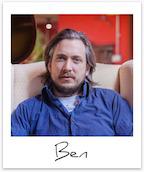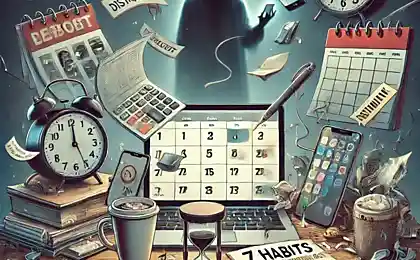794
The most simple ways to effectively learn
Finding school GraalyaKakim may be the easiest way to learn? David Robson met with a group of scientists who have studied people with a phenomenal memory in the course of the competition to find the best method of storing information as soon as possible.
Faced with the leading experts on memory, I felt how perfect my mind. Ben Whately, for example, told me about the famous mnemonist Matteo Ricci, a Jesuit priest who lived in the 16th century, who became the first European to pass the exam to high public office in China.

This examination was painful trial and included memorizing the set of classical Chinese poetry. The mission could leave a lifetime. "Only 1% of people can pass this exam. Ricci passed it over 10 years, although I do not speak Chinese ».

Perhaps the psychology could give some amazing command our minds? Figure it out - the purpose of Whately. Together with the former champion, mnemonist Ed Cook, he created the app Memrise, the foundation works on the principle of mnemonics.
And Whately and Cooke teamed up with researchers from University College London and organized a competition in an attempt to find the best way to improve memory techniques.

They asked experts on memory from around the world to conduct a series of experiments to find the most effective way to memorize new information.
The first phase was conducted a fascinating study shows how our memory. "The aim of this competition outwardly seemed simple - Rosalind says Potts. - We would like to know what to do to a week later to recall a list of 80 words, the study of which the subjects were given an hour ».
The task was complicated by the fact that the proposed 80 words were Lithuanian. The subjects were used for storing their special techniques, and then the results were compared with another group of subjects who did not use any special techniques.

Despite the fact that in the experiments was attended by leading scientists from around the world, some of their techniques have not led to a significant improvement in memory. "This demonstrates how difficult it is to transfer scientific principles to study in real life" - says David Shanks.
Boredom, for example, can be a serious obstacle: the same team during the sleep test session memorizing time, despite the fact that the test for participation in the study were given cakes.
Despite these minor flaws, many teams have found certain ways, allowing them to double the number of those who truly remember all the words.
Instead of focusing on any one memorization technique, they tend to use a combination of the following strategies.
1. Using the ignorance to the maximum. Self-control - is one of the best ways to improve memory. For me, the most surprising, and perhaps the most useful part of this technique was a strategy called "erroneous generation". It subjects were forced to guess the value of the Lithuanian word, without any prior preparation.
"If you do it the first time, mistakes are inevitable - says Shanks. - However, psychological studies have shown that these initial errors contribute to memorize words, with words to remember much better than traditional memorization ».
It seems a simple recognition of his own ignorance pushes our minds for action: The results of the group were two times better than those who did not use this strategy. It is based on the idea of "desirable difficulties" if to make the task more difficult, it can take all your attention and create a more solid basis for subsequent calls of this problem from the memory.
2. Surfing the waves of memory. to memorizing words was not a waste of time, many of the subjects developed specific algorithms for each of the 80 words to be able to run these algorithms as soon as the words will be forgotten.
Annex Memrise have one version of this approach is that you can use now, and the test will be able to suggest further ways to improve this version.
In addition, you can rely on your intuition to facilitate the acquisition of knowledge: do the periods between re-checking their knowledge longer and longer, and learn from your mistakes.
One participant experimented by giving his subjects short breaks during memorization of words (he allowed them to watch a video with a waterfall), which allows information to better "soak". Of course, when you are learning is always to take short breaks to physical fatigue will not affect your natural ability.
3. "Study buffet». It can be very tempting to smash test material on specific topics and examine them individually. Therefore, some subjects were pooled in the category of proposed words on a particular topic.
But one team has found that the mere repetition of words 80 can also be effective. Whately says mnemonist champions, storage sequence of card decks, use a similar approach: rapid repetition throughout the entire deck instead of phasing it memorization, block by block.
Nevertheless, scientists have always offered to make at least some diversity in research sessions. It is better to spend a little time intervals on a variety of subjects and skills, rather than focusing on a single topic.
4. Storytelling. Any form of "careful study" may help activate the brain synapses and memory. One participant asked subjects to create a story from the words they memorized. And yet Whately Cooke and were pleased to see how one group of subjects trying to implement a "memory palace" in which certain words are associated with specific objects in the room.
The program, which they designed, can show you picture living room and Lithuanian word «lova» - bed. Here you can present your loved one, lying on the bed. Once you have recorded the word in memory in this way, it will be easy to go back and remember it.
In fact, it is this technique allowed the Jesuit Matteo Ricci learn Chinese, and she stands up for the ability to remember the Cook 2265 binary digits in less than half an hour. A program developed by Cook and Whately, can greatly simplify the process, making it fully automatic.
At the moment, the team decided on the most promising methods of memorization listed above, and are engaged in loading data to the website of the program Memrise. This will allow them more time to push these methods with each other to evaluate their effectiveness and identify the final winner, who will receive $ 10 000.
Plus for Memrise that so developers will be able to determine the methods that allow to improve this app.
A Potts and Shanks will be able to see which combination works best in the real world, after checking them again to the volunteers who will be much greater than in a typical laboratory study.
Training igraSudi hope to run such events each year to further improve the art of remembering. In the future they may consider more imaginative approaches. Shanks, for example, points to a single project, which this year has not been tested, but which could be a promising strategy in the future.
"It was created a video game in which you need to shoot down from the sky spacecraft, and ships in a completely random order appear Lithuanian and English words - he said. - I think it was a brilliant idea ».
But the really serious problems facing experts memory is to make a quick memorization. Every student knows that the biggest obstacle is learning distraction - no matter what it is, the idea is to enjoy the sun in the park or watch TV. And we will probably need a lot more competition, before we can overcome this obstacle.
via www.bbc.com/future/story/20150429-how-to-learn-with-zero-effort
Faced with the leading experts on memory, I felt how perfect my mind. Ben Whately, for example, told me about the famous mnemonist Matteo Ricci, a Jesuit priest who lived in the 16th century, who became the first European to pass the exam to high public office in China.

This examination was painful trial and included memorizing the set of classical Chinese poetry. The mission could leave a lifetime. "Only 1% of people can pass this exam. Ricci passed it over 10 years, although I do not speak Chinese ».

Perhaps the psychology could give some amazing command our minds? Figure it out - the purpose of Whately. Together with the former champion, mnemonist Ed Cook, he created the app Memrise, the foundation works on the principle of mnemonics.
And Whately and Cooke teamed up with researchers from University College London and organized a competition in an attempt to find the best way to improve memory techniques.

They asked experts on memory from around the world to conduct a series of experiments to find the most effective way to memorize new information.
The first phase was conducted a fascinating study shows how our memory. "The aim of this competition outwardly seemed simple - Rosalind says Potts. - We would like to know what to do to a week later to recall a list of 80 words, the study of which the subjects were given an hour ».
The task was complicated by the fact that the proposed 80 words were Lithuanian. The subjects were used for storing their special techniques, and then the results were compared with another group of subjects who did not use any special techniques.

Despite the fact that in the experiments was attended by leading scientists from around the world, some of their techniques have not led to a significant improvement in memory. "This demonstrates how difficult it is to transfer scientific principles to study in real life" - says David Shanks.
Boredom, for example, can be a serious obstacle: the same team during the sleep test session memorizing time, despite the fact that the test for participation in the study were given cakes.
Despite these minor flaws, many teams have found certain ways, allowing them to double the number of those who truly remember all the words.
Instead of focusing on any one memorization technique, they tend to use a combination of the following strategies.
1. Using the ignorance to the maximum. Self-control - is one of the best ways to improve memory. For me, the most surprising, and perhaps the most useful part of this technique was a strategy called "erroneous generation". It subjects were forced to guess the value of the Lithuanian word, without any prior preparation.
"If you do it the first time, mistakes are inevitable - says Shanks. - However, psychological studies have shown that these initial errors contribute to memorize words, with words to remember much better than traditional memorization ».
It seems a simple recognition of his own ignorance pushes our minds for action: The results of the group were two times better than those who did not use this strategy. It is based on the idea of "desirable difficulties" if to make the task more difficult, it can take all your attention and create a more solid basis for subsequent calls of this problem from the memory.
2. Surfing the waves of memory. to memorizing words was not a waste of time, many of the subjects developed specific algorithms for each of the 80 words to be able to run these algorithms as soon as the words will be forgotten.
Annex Memrise have one version of this approach is that you can use now, and the test will be able to suggest further ways to improve this version.
In addition, you can rely on your intuition to facilitate the acquisition of knowledge: do the periods between re-checking their knowledge longer and longer, and learn from your mistakes.
One participant experimented by giving his subjects short breaks during memorization of words (he allowed them to watch a video with a waterfall), which allows information to better "soak". Of course, when you are learning is always to take short breaks to physical fatigue will not affect your natural ability.
3. "Study buffet». It can be very tempting to smash test material on specific topics and examine them individually. Therefore, some subjects were pooled in the category of proposed words on a particular topic.
But one team has found that the mere repetition of words 80 can also be effective. Whately says mnemonist champions, storage sequence of card decks, use a similar approach: rapid repetition throughout the entire deck instead of phasing it memorization, block by block.
Nevertheless, scientists have always offered to make at least some diversity in research sessions. It is better to spend a little time intervals on a variety of subjects and skills, rather than focusing on a single topic.
4. Storytelling. Any form of "careful study" may help activate the brain synapses and memory. One participant asked subjects to create a story from the words they memorized. And yet Whately Cooke and were pleased to see how one group of subjects trying to implement a "memory palace" in which certain words are associated with specific objects in the room.
The program, which they designed, can show you picture living room and Lithuanian word «lova» - bed. Here you can present your loved one, lying on the bed. Once you have recorded the word in memory in this way, it will be easy to go back and remember it.
In fact, it is this technique allowed the Jesuit Matteo Ricci learn Chinese, and she stands up for the ability to remember the Cook 2265 binary digits in less than half an hour. A program developed by Cook and Whately, can greatly simplify the process, making it fully automatic.
At the moment, the team decided on the most promising methods of memorization listed above, and are engaged in loading data to the website of the program Memrise. This will allow them more time to push these methods with each other to evaluate their effectiveness and identify the final winner, who will receive $ 10 000.
Plus for Memrise that so developers will be able to determine the methods that allow to improve this app.
A Potts and Shanks will be able to see which combination works best in the real world, after checking them again to the volunteers who will be much greater than in a typical laboratory study.
Training igraSudi hope to run such events each year to further improve the art of remembering. In the future they may consider more imaginative approaches. Shanks, for example, points to a single project, which this year has not been tested, but which could be a promising strategy in the future.
"It was created a video game in which you need to shoot down from the sky spacecraft, and ships in a completely random order appear Lithuanian and English words - he said. - I think it was a brilliant idea ».
But the really serious problems facing experts memory is to make a quick memorization. Every student knows that the biggest obstacle is learning distraction - no matter what it is, the idea is to enjoy the sun in the park or watch TV. And we will probably need a lot more competition, before we can overcome this obstacle.
via www.bbc.com/future/story/20150429-how-to-learn-with-zero-effort
10 "post-apocalyptic" places that have become landmarks
Is it possible to be healthy, being overweight?
























